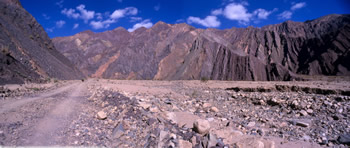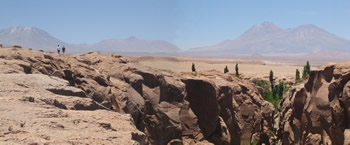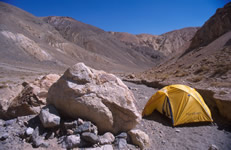|
Where did you grow up and go to school?
I spent my formative years in suburban Adelaide, S.A., and went to a smallish private co-ed high school called Scotch College. My folks are kind of country people and our family holidays were always out bush; either in the Flinders Ranges climbing hills or beach fishing on the southeastern or western coasts of S.A.

What inspired you to do science?
I couldn't help but be inspired to do science. Growing up around my extended family of geologists, engineers, botanists and doctors, it's hard not to be inquisitive and to be interested by the natural world. I suppose it's a natural to go from there to being interested in science. It's also fair to say that I fell into sciences partly because I had this wealth of background knowledge at home, and that in my family arts are generally considered somehow inferior. There was an unspoken understanding that my brother and I would do something science based, but that's a very broad description and our parents never pushed us any harder than that. As a teenager craving acceptance and attention, I made choices based on what I found easy to be good at. For me, given the environment I grew up in, that was geology.
What did you study at university?
I came to university with a clear goal: to graduate from the best geology school in the country. I did that, and along the way studied a bit of physics, chemistry...and a string of foreign languages. The science part was more or less as I expected, but in a lot of respects my language studies were the best part of my university experience, and I'd encourage all science students to broaden their horizons in that regard. There is a definite need for high quality pure scientists, but there is also a generally under-appreciated need for people with real scientific ability and understanding, who can also see the social or economic implications and applications of that science.

What are you doing now?
I'm in the final six months of my PhD - though you wouldn't know it because I still have a long way to go. My research concerns the geological evolution of a 400 km2 area of the northern Chilean Andes mountains, and attempts to explain why that particular area contains so many large, rich, deposits of copper, molybdenum, and to a lesser extent silver and gold. That work has seen me make three trips to Chile over the last two years, polish my Spanish language skills, and climb more mountains above 4000 metres than I'd have ever thought possible.
 I've also worked in exploration geology (i.e. that branch of geology charged with finding new mineral resources) before, and during my postgraduate studies. I intend to return to that professional world as soon as I finish at UTas, hopefully in a capacity that lets me use the investigative knowledge I've gained in the last couple of years. Exploration geology is a profession that cannot effectively separate itself from the locations where minerals occur. That means I'll likely leave Australia for much of the next stage of my career, current likely options including Turkey, Ghana, Quebec, and most of South America. I've also worked in exploration geology (i.e. that branch of geology charged with finding new mineral resources) before, and during my postgraduate studies. I intend to return to that professional world as soon as I finish at UTas, hopefully in a capacity that lets me use the investigative knowledge I've gained in the last couple of years. Exploration geology is a profession that cannot effectively separate itself from the locations where minerals occur. That means I'll likely leave Australia for much of the next stage of my career, current likely options including Turkey, Ghana, Quebec, and most of South America.
What do you love about science?
Love is always a strange concept that seems to encapsulate an idea of liking and trusting something. I like science because of the detective-like side of it; the idea that my work might just uncover something that no-one has recognised before. I trust science because throughout my life I've found largely reliable scientific explanations for the majority of my questions. Both of those things have made science infinitely more attractive for me than religion, but one more reason to like science is that it is dynamic; scientific ideas, and the people who believe them are open to review and adjustment as more information becomes available. That's an admirable trait in my book.
|
|
